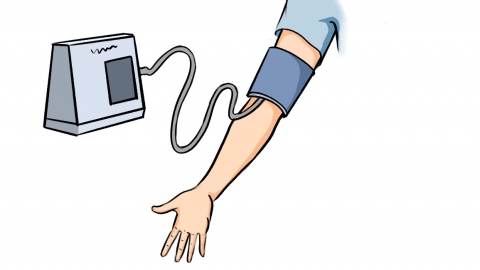What is hypertension during female menopause, and how should it be managed?
In general, hypertension during female menopause may be caused by declining estrogen levels, age-related reduction in vascular elasticity, emotional fluctuations, weight gain, sleep disturbances, and other factors. It is recommended to seek medical attention promptly, identify the underlying causes, and then improve the condition under a doctor's guidance through lifestyle modifications, medications, and other treatments. The specific analysis is as follows:

1. Declining estrogen levels: During menopause, ovarian function declines and estrogen secretion decreases, leading to dysregulation of vascular constriction and dilation, which can elevate blood pressure. Maintain a regular sleep schedule and avoid staying up late. Consuming soy products may help supplement plant-based estrogens. Regular blood pressure monitoring is also recommended to track fluctuations.
2. Age-related decline in vascular elasticity: With aging, the elastic fibers in blood vessel walls decrease, vessel stiffness increases, and peripheral vascular resistance rises, contributing to hypertension. Engaging in 150 minutes per week of moderate-intensity aerobic exercise—such as brisk walking or yoga—can promote blood circulation and slow vascular aging.
3. Emotional and psychological fluctuations: Menopausal women are prone to anxiety, irritability, and depression, which can overactivate the sympathetic nervous system, increasing heart rate and elevating blood pressure. Emotions can be managed through listening to music, meditation, or communicating with family members. If necessary, medications such as estazolam tablets, alprazolam tablets, or sertraline hydrochloride tablets may be used under medical supervision to alleviate emotional symptoms.
4. Weight gain: Metabolism slows during menopause, and poor dietary control can lead to weight gain. Excess fat accumulation increases cardiovascular burden and may trigger hypertension. Adjust dietary habits by reducing intake of high-fat, high-salt, and high-sugar foods, controlling daily caloric intake, and combining diet with physical activity for weight management.
5. Sleep disturbances: Hot flashes and night sweats common during menopause can impair sleep quality. Chronic sleep deprivation disrupts blood pressure regulation and may lead to elevated blood pressure. Avoid consuming coffee or strong tea before bedtime, and maintain a quiet, comfortable sleeping environment. For severe sleep issues, medications such as zopiclone tablets, zolpidem tartrate tablets, or eszopiclone tablets may be used under medical guidance to improve sleep.
In daily life, maintain a light diet with no more than 5 grams of salt per day; quit smoking and limit alcohol consumption to avoid unhealthy lifestyle habits; maintain emotional stability and avoid excessive stress or anxiety. Comprehensive management strategies can help maintain stable blood pressure and reduce menopausal discomfort.







